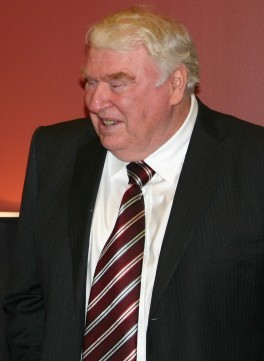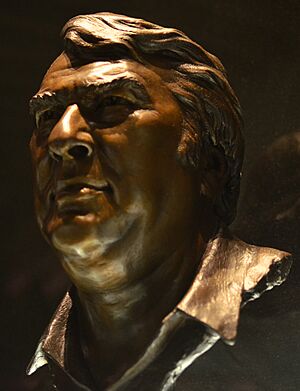John Madden facts for kids

Madden in 2007
|
|
| No. 77 | |
|---|---|
| Position: | Offensive tackle |
| Personal information | |
| Born: | April 10, 1936 Austin, Minnesota |
| Died: | December 28, 2021 (aged 85) Pleasanton, California |
| Career information | |
| High school: | Jefferson (Daly City, California) |
| College: | Cal Poly |
| NFL Draft: | 1958 / Round: 21 / Pick: 244 |
| Career history | |
| As player: | |
|
|
| * Offseason and/or practice squad member only | |
| As coach: | |
|
|
| Career highlights and awards | |
|
|
| Head coaching record | |
| Regular season: | 103–32–7 (.750) |
| Postseason: | 9–7 (.563) |
| Career: | 112–39–7 (.731) |
| Coaching stats at PFR | |
|
Pro Football Hall of Fame
|
|
John Earl Madden (born April 10, 1936 – died December 28, 2021) was a famous American football coach and sports commentator. He is best known for leading the Oakland Raiders to a Super Bowl win and for his exciting commentary on NFL games. He also lent his name to the popular Madden NFL video game series.
Madden coached the Oakland Raiders from 1969 to 1978. During this time, his team made it to the playoffs eight times. They won seven division titles and even won their first Super Bowl in Super Bowl XI. John Madden never had a losing season as a head coach. He has one of the highest winning percentages among NFL head coaches who coached 100 games or more.
After he stopped coaching, Madden became a color commentator for NFL games from 1979 to 2008. He won 16 Sports Emmy Awards for his work. He worked for all four major American TV networks: CBS, Fox, ABC, and NBC. In 2006, John Madden was inducted into the Pro Football Hall of Fame.
Contents
Early Life and Football Dreams
John Madden was born in Austin, Minnesota. When he was young, his family moved to Daly City, California, near San Francisco. He went to Jefferson High School and graduated in 1954.
Playing Football in College
Madden was a football star in high school. He played one season at the College of San Mateo in 1954. Then, he got a football scholarship to the University of Oregon. He had a knee injury and needed surgery, which meant he couldn't play for a while.
He later transferred to Cal Poly in San Luis Obispo. There, he played both offense and defense for the Mustangs in 1957. He was even named an all-conference offensive tackle. He also played baseball as a catcher for Cal Poly.
Drafted by the NFL
In 1958, the Philadelphia Eagles drafted Madden in the 21st round of the 1958 NFL Draft. However, he got another knee injury during his first training camp. This injury sadly ended his playing career before he could play professionally.
Coaching Career Highlights
John Madden's playing career ended early, but he found a new path in coaching. He said that watching films with a coach helped him understand the game better. Since he had a teaching degree, he decided to combine his love for football with teaching.
College Coaching Days
In 1960, Madden started as an assistant coach at Allan Hancock College in Santa Maria. By 1962, he became the head coach. He coached there for two seasons, with an impressive 8–1 record in 1963.
After that, he became a defensive assistant coach at San Diego State from 1964 to 1966. He learned a lot from coach Don Coryell there.
Leading the Oakland Raiders
In 1967, Al Davis hired Madden as a linebackers coach for the Oakland Raiders. Just two years later, on February 4, 1969, Madden became the Raiders' head coach. At 32 years old, he was the youngest head coach in professional football at the time.
Madden's first Raiders team had a great record of 12–1–1 in 1969. Over his ten seasons as head coach, the Raiders always had a winning record. They won seven AFC West division championships.
One of his most famous wins was in Super Bowl XI. On January 9, 1977, Madden led the Raiders to a 32–14 victory over the Minnesota Vikings. This was his first and only NFL title.
Madden retired from coaching on January 4, 1979. He was only 42 years old and had become the youngest coach to reach 100 regular-season victories. He is still the coach with the most wins in Raiders history. John Madden never had a losing season as a head coach.
Head Coaching Records
Allan Hancock College Bulldogs
| Year | Team | Overall | Conference | Standing | Bowl/playoffs | ||||
|---|---|---|---|---|---|---|---|---|---|
| Allan Hancock College (Central California Junior College Athletic Association) (1962–1963) | |||||||||
| 1962 | Allan Hancock | 4–5 | 2–2 | 3rd | |||||
| 1963 | Allan Hancock | 8–1 | 4–0 | 1st | |||||
| Allan Hancock: | 12–6 | 6–2 | |||||||
| Total: | 12–6 | ||||||||
| National championship Conference title Conference division title or championship game berth | |||||||||
Oakland Raiders
| Team | Year | Regular season | Postseason | |||||||
|---|---|---|---|---|---|---|---|---|---|---|
| Won | Lost | Ties | Win % | Finish | Won | Lost | Win % | Result | ||
| OAK | 1969 | 12 | 1 | 1 | .893 | 1st in AFL Western | 1 | 1 | .500 | Lost to Kansas City Chiefs in AFL Championship Game |
| OAK | 1970 | 8 | 4 | 2 | .643 | 1st in AFC West | 1 | 1 | .500 | Lost to Baltimore Colts in AFC Championship Game |
| OAK | 1971 | 8 | 4 | 2 | .643 | 2nd in AFC West | – | – | – | – |
| OAK | 1972 | 10 | 3 | 1 | .750 | 1st in AFC West | 0 | 1 | .000 | Lost to Pittsburgh Steelers in Divisional Round |
| OAK | 1973 | 9 | 4 | 1 | .679 | 1st in AFC West | 1 | 1 | .500 | Lost to Miami Dolphins in AFC Championship Game |
| OAK | 1974 | 12 | 2 | 0 | .857 | 1st in AFC West | 1 | 1 | .500 | Lost to Pittsburgh Steelers in AFC Championship Game |
| OAK | 1975 | 11 | 3 | 0 | .786 | 1st in AFC West | 1 | 1 | .500 | Lost to Pittsburgh Steelers in AFC Championship Game |
| OAK | 1976 | 13 | 1 | 0 | .929 | 1st in AFC West | 3 | 0 | 1.000 | Super Bowl XI champions |
| OAK | 1977 | 11 | 3 | 0 | .786 | 2nd in AFC West | 1 | 1 | .500 | Lost to Denver Broncos in AFC Championship Game |
| OAK | 1978 | 9 | 7 | 0 | .563 | 2nd in AFC West | – | – | – | – |
| Total | 103 | 32 | 7 | .750 | 9 | 7 | .563 | |||
Life as a Sportscaster
After coaching, John Madden became a very popular football commentator. He was known for his energetic style and easy-to-understand explanations of plays.
Working for Major Networks
Madden joined CBS in 1979. In 1981, he teamed up with Pat Summerall, forming one of the most famous broadcasting duos in sports. They called eight Super Bowls together.
When the Fox Network started broadcasting NFL games in 1994, Madden and Summerall moved to Fox. This move helped Fox become a major sports network.
In 2002, Madden moved to ABC to work on Monday Night Football with Al Michaels. Then, in 2006, he joined NBC, becoming the first sportscaster to work for all four major U.S. broadcast networks.
Madden called his last game, Super Bowl XLIII, on February 1, 2009. He officially retired from broadcasting on April 16, 2009.
Madden's Unique Style
Madden's commentary was full of exciting words like "Boom!", "Whap!", and "Bang!". He also made the telestrator famous. This device allowed him to draw on the screen to explain football plays. His use of the telestrator helped other sports broadcasters use it too.
He was also known for his tradition during the annual Thanksgiving Day games. He would give a turkey or a turducken to the winning team. He even gave out a "nuclear turkey" with eight drumsticks!
The All-Madden Team
In 1984, Madden created the "All-Madden" team. This was a group of players he felt truly represented how football should be played. He picked this team until 2001. He even wrote a best-selling book called All Madden.
He explained that being "All-Madden" meant a player was tough and played with passion. It was about players who got dirty and played hard.
Other Appearances and the Video Game
John Madden also appeared in movies and commercials. He was in the films Little Giants and The Replacements. He even hosted Saturday Night Live in 1982.
The Madden NFL Video Games
Starting in 1988, Madden lent his name, voice, and ideas to the John Madden Football video game series. Later, it became known as Madden NFL. These games became the best-selling football video games of all time.
Even after he retired from broadcasting, Madden continued to be involved with the game series until his death. He believed the games were a great way for people to learn about football. He saw them as a tool to understand the game at a high level.
Awards and Honors

NFL
- Super Bowl XI winner (as head coach of the Oakland Raiders)
Broadcasting
- 12-time Emmy Award winner
- 1984 NSMA National Sportscaster of the Year
- 2002 Pete Rozelle Radio-Television Award winner
Halls of Fame
- Bay Area Sports Hall of Fame (class of 1991)
- Pro Football Hall of Fame (class of 2006)
- California Hall of Fame (class of 2009)
- 2010 NSMA Hall of Fame inductee
Personal Life and Travel
Madden met his wife, Virginia Fields, in 1959, and they were married for 62 years. They lived in Pleasanton, California. They had two sons, Joseph and Michael, who both played college football.
Fear of Flying
John Madden was well-known for his fear of flying. He had lost friends in a plane crash in 1960. However, his fear of flying didn't start until 1979 when he had a panic attack on a flight. After that, he never flew on a plane again. He said his fear was mostly claustrophobia, not a fear of heights or turbulence.
To travel across the country for games, Madden used a custom bus called the "Madden Cruiser." This bus allowed him to travel comfortably without flying. He even used his bus to help former ice skater Peggy Fleming get home after flights were grounded following the September 11, 2001 attacks.
Death
John Madden passed away at his home in Pleasanton, California, on December 28, 2021, at the age of 85. NFL Commissioner Roger Goodell said that Madden "was football" and that "there will never be another John Madden."
Images for kids
See also
 In Spanish: John Madden (fútbol americano) para niños
In Spanish: John Madden (fútbol americano) para niños
 | Frances Mary Albrier |
 | Whitney Young |
 | Muhammad Ali |



